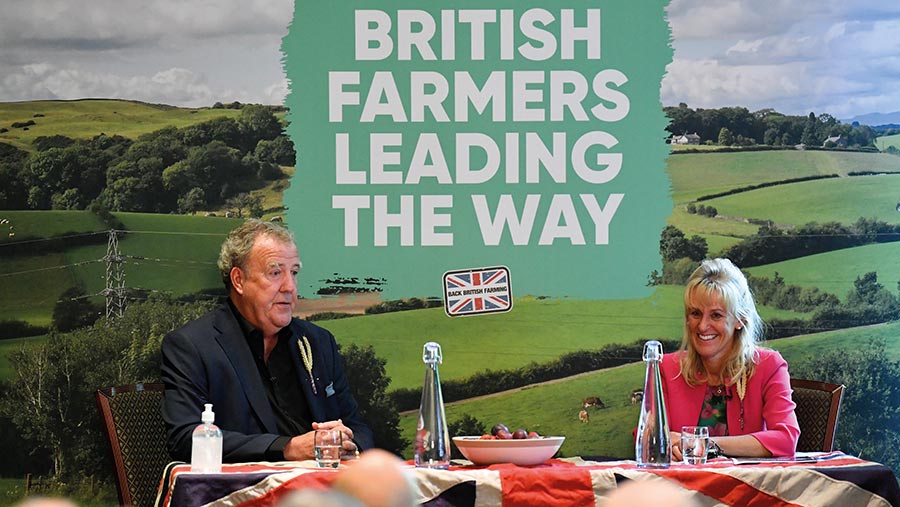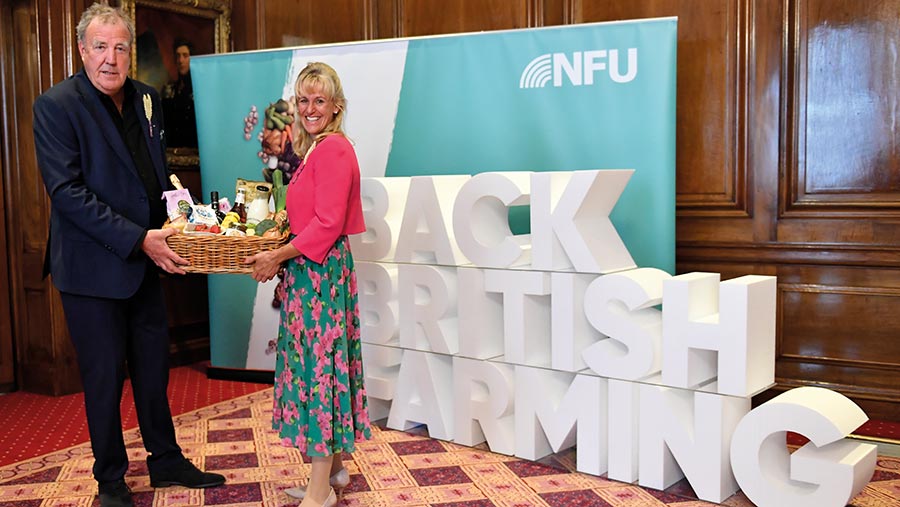Jeremy Clarkson Q&A on farming – the best bits
 Jeremy Clarkson and Minette Batters at last year's NFU Q&A session
Jeremy Clarkson and Minette Batters at last year's NFU Q&A session Jeremy Clarkson has spoken candidly about the ups and downs of his first two years as a newbie farmer and revealed his hopes for the future, during a question-and-answer session hosted by the NFU.
The 61-year-old TV presenter-turned-farmer joined NFU president Minette Batters on the stage for the hour-long event, which took place in Westminster, London, on Wednesday (15 September).
The event was held to mark Back British Farming Day and the launch of the NFU’s new Food Report, which recognises the key role farmers play in producing food for the nation and their contribution to national and global food security.
See also: Video: Jeremy Clarkson tells FW farming ‘harder than I thought’
Dressed immaculately in a blue suit and black shirt, Mr Clarkson wore the emblem of the day – a wool and wheatsheaf pin badge – as he lifted the lid on his first two years as a “trainee” farmer, the surprise success of his Amazon Prime hit TV series Clarkson’s Farm, his plans for the second series and much, much more.
Here are some of the best bits:
Is farming everything you thought it was going to be?
No. I honestly thought farming, I would just get in my Range Rover and drive round and look at things. I really did. I just thought you put seeds in the ground, weather happens and then some money comes.
It’s so unusual to get a completely new lease of life at 60. You do one thing for 30 years and suddenly find you’re doing something completely different. I’m absolutely loving it.
What are the biggest challenges you think both you and British agriculture is facing more generally?
Weather has been a really big challenge. I don’t know whether it’s climate change, but the last two years have been bonkers…
Weather is by far and away the thing that keeps me awake all night, every night. And then form-filling. That’s what I really do for a living. I get up and fill in forms.
They want to know how many broad beans I have planted. Why don’t they just close Defra? I’d close all of it. Gone.
How do you think we could move forward in the countryside to improve the planning system?
I’m right in the middle of red tape, as we speak. I’ve just bought a “fleet” of shorthorn cattle. In order, realistically, for me to be able to compete with grain-fed Aussie beef, I have to be able to sell those cows myself, which means I need to have some kind of café/restaurant.
To turn the lambing barn into a restaurant, which is right next door to the shop, kind of all makes sense – except you find yourself into the world of planning.
We need planning permission; you can’t just have people building what they want. But I think farmers should perhaps be given a little bit of grace in these next five years as the subsidies come down.
What are your views on vegans?
If you want to eat seeds and so on, that’s fine. One of my children is a vegan. She will grow out of it. She’s going through that phase now.
We have a production team that made the show. I think four of them are vegan and one of them said to me last weekend, “Would it be possible if I took half a dozen eggs home?”
I’ve been looking at the hens and they have a nice life and they make the eggs anyway, so we may as well eat them. My goal by the end of the filming year, which is next July, is to have all of them tucking in to some of the beef.
What is the best piece of advice you’ve received on the farm?
The best piece of advice is to relax, which came from Simon, my neighbour. He just said, “Look, you will plant the seeds and you will get the harvest in.”
He said, “I have, every year.” He said, “Just relax,” which I can’t. But it’s a very good piece of advice. And stop thinking I can control everything, which I can’t.
You had a town hall meeting with neighbours about your farm shop. How are relations and how did it go?
I think going to talk to the village was not a bad idea because there was a great deal of animosity.
They don’t like the great numbers of people that turn up at the farm shop. But I think by the end, when I started saying, “If I get the restaurant, you’ll all have 10% discount,” they were all like, “OK.”
Do you think that supermarkets should do more to support British farmers? What more could they do?
Could supermarkets do more to support farmers? Yes, sure. Will they? Probably not, because price is everything.

© NFU
The industry and even retailers have struggled to help people understand how their food is being produced, but you’ve captured the imagination of the British public. How have you done it?
Nobody was expecting that [Clarkson’s Farm] would be particularly successful, after we made it, even at Amazon… We never saw this coming. I can’t work out why people thought, “I’m now interested in food and farming, and the environment.”
I haven’t got a clue. What I tend to do is simplify things down. Use hyperbole and simplify has always been my motto.
What have you learned about the diversity of insects on your farm?
I put in a few ponds, which is good for floodwater, somehow. Lots of dragonflies have come. Now when I drive around the farm, I get insects on the car windscreen. I’ve noticed that there is much improved bird life on the farm in the last 12 months. I haven’t seen flocks of goldfinches or yellowhammers since I was a kid. I saw two lapwings the other day.
Just by doing beetle strips in the middle of fields… I get £300 worth of happiness knowing that there are insects in there, and then birds are coming. I even saw a woodpecker for the first time the other day.
Everything is just better on the farm since I started paying a little bit of attention.
How are you coping with Kaleb [Cooper] being a bigger star than you? What can we do to get more young farmers on to our land?
I think Kaleb’s probably been the best thing for young farming in donkey’s years. He replies to all the people who write to him and say, “I want to be a farmer.”
There is one scene [in the series] when my children left me to go solo. There was the mist in the valley and I just thought, “Well, this is a nice commute this morning.”
In addition to focusing on the problems of farming, I think we ought to focus on those rare, but very satisfying moments when you sit there and think, “Well, actually, this is a really, really nice way of earning a living.”
I think that will hopefully get the young people to come and do it.
Has your trailer driving got any better through grain carting this harvest season?
I was so disappointed the other night. It was late. The harvest was tight this year. It was difficult to get it in. It was 2am and I’d done 30 runs. I was just reversing and thinking, “I’m doing such a good job with this one.”
I looked in the tractor mirror and I could see I was gonna kiss the door. It was dark, but the light was on in the barn. I hadn’t realised that I was lining up on the pedestrian door, so I have actually taken half the barn down.
The next day, all three bins were over, and I’d run over them and everything in them. I’d done two five-bar gates and the barn.
Lisa said to me, “You said it went well.” I said I hadn’t even noticed I’d done it! I’m learning. Well, I’m trying to, anyway. I don’t think my tractor is big enough…
If you were prime minister, what would you do for the future of UK agriculture?
We have a Ministry of Defence so that should the country be attacked, we are able to defend ourselves.
None of us could see the Germans coming across the Channel, but we still maintain a significant air force, army and navy. Surely, if you’re going to maintain that sort of level to protect us, you would want to protect our food supply.
This seems to me to be very, very fundamental.
Clarkson’s Farm will return to Amazon Prime Video for a second series at a date yet to be confirmed.
